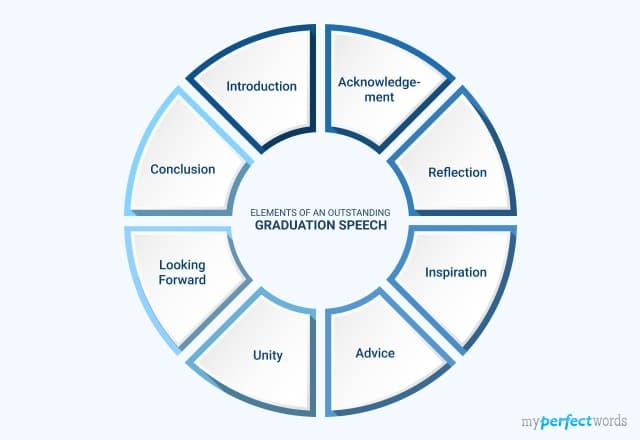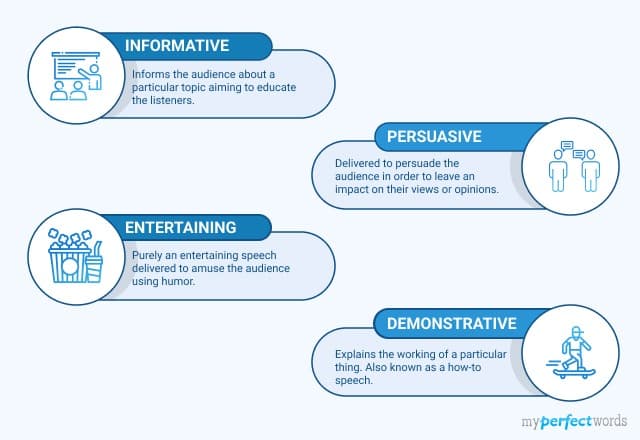
Going back in history, a powerful speech backed up many significant events. Such speeches were delivered by people with speech-giving skills of the highest order.
Public speaking is an art, and to master it, the speaker should have a clear objective in mind. The presenter has to understand and tailor the speech to the nature of the audience.
That being said, having a clear objective and purpose of speech in mind makes the speech writing process simpler and more manageable.
But the question comes to mind: “How many types of speeches are there?”
Worry not, as in this blog, we will understand the different types of speeches with examples. At the end, there are some handy tips for you to ease your speech-writing process!
Carry on reading!
On This Page![]()
- 1. What are The Different Types of Speeches in English?
- 2. Types of Speeches According to the Purpose
- 3. Types of Speeches According to the Delivery
- 4. Types of Speeches According to Special Occasion
- 5. Other Types of Speeches
- 6. Tips to Conduct Effective Research for Your Speech
What are The Different Types of Speeches in English?
Although there is a variety of speech types, we generally look at speeches in three different ways.
- Types of speeches according to the purpose
- Types of speeches according to the delivery
- Types of speeches according to special occasion
Apart from the above types, there are some other types of speeches as well, which we will address later!
Now, let’s set sail for the types of speeches according to the purpose.
Types of Speeches According to the Purpose
Each and every speech has a specific purpose, i.e., some are delivered to entertain the audience, and others might be delivered to inform the audience.
When a speaker delivers a speech, he has a clear purpose in his mind for why he wants to convey this message to the audience.
The principal purpose of delivering a speech falls into four basic categories:
1. Informative Speech
When a speaker tries to inform a particular group or audience about a particular subject, they’re delivering an informative speech. The sole aim of an informative speech is to educate the audience on a topic.
The presenter may make use of facts and statistics to deliver an impactful informative speech. Such speeches deliver new information on a specific place, person, issue, or occasion by describing, explaining, and defining.
These are some common types of informative speeches:
- Explanatory Speech: Delivered to clarify a complex topic, process, or concept by breaking it down into understandable elements, making it easier for the audience to grasp.
- Descriptive Speech: It is a kind of informative speech that creates an accurate picture of a certain individual, place, or thing in the mind of the audience.
- Definition Speech: A definition speech provides clear explanations of terms, concepts, or ideas, allowing the audience to understand the meaning of the subject.
Possible scenarios of informative speeches could be:
- A CEO’s reporting on the company's financial performance for the past month, highlighting revenue, expenses, and net profit.
Here is a more detailed example of a compelling informative speech and a sample speech for students:
2. Persuasive Speech
In a persuasive speech, the speaker aims to persuade the audience with their opinion. Using persuasive language, the orator tries to reinforce the listeners' perspectives, or feelings about a particular subject.
Including factual evidence is necessary in a persuasive speech. With concrete details, there is a higher chance of persuading the audience to agree with what you make claims about.
This genre of speech is the hardest because it is difficult to convince people of anything. And it becomes more difficult if you ask them to challenge their current belief and think out of that perspective.
Some common persuasive speech types are:
- Policy Persuasion: Urges for specific actions or policies, aiming to influence the audience's decision-making.
- Value Persuasion: Seeks to modify or fortify the audience's beliefs, values, or attitudes about a particular theme or topic.
- Fact Persuasion: Focuses on presenting facts and evidence to persuade the audience to accept a certain point of view.
An example of a persuasive speech could be:
- Encouraging the audience to vote in the upcoming election to have a say in shaping our community's future.
Here is a complete example of a persuasive speech:
3. Entertaining Speech
Have you ever been to an employee’s promotional party or even a standup comedy session? If the speaker managed to entertain you or make you laugh, they delivered an entertaining speech!
In the most simple words, entertainment speeches are intended to entertain the audience. The basic purpose of such kinds of speeches is to provide pleasure and enjoyment that make the audience laugh.
Although this speech is meant to make the audience laugh and enjoy the occasion, it should have a lighter moment as well.
Here are some types of entertaining speeches:
- Humorous Speech: Makes use of humor, jokes, and comedy to amuse and entertain the audience.
- Storytelling Speech: Aims to engage the listeners by sharing a relatable story to convey a message or illustrate a point. Quite often, the presenter uses vivid details and emotions.
- Roast or Toast: In such a speech, an individual is targeted and teased with the help of humor in a lighthearted way. In a toast, the speaker celebrates or honors someone’s success, typically on a positive note.
Let’s see what an example of an entertaining speech could be:
- A standup comedy session in your college, organized by some society members!
For a detailed insight on entertaining speeches, take a look at this example:
4. Demonstrative Speech
Also known as a how-to speech, a demonstrative speech is given to demonstrate the working of a particular thing. Typically, a demonstrative speech makes use of visual aids for a clear understanding.
A little detail to notice is that you shouldn’t confuse a demonstrative speech with an informative speech. Although both types of speeches provide new information to the audience, demonstrative speeches demonstrate how to do or perform something.
Here are some types of demonstrative speech:
- Process Demonstrative Speech: Guides the audience through a series of steps or a sequence of actions to achieve a specific outcome or create something.
- Object Demonstrative Speech: Provides detailed information about a specific object, focusing on its characteristics, features, and uses.
- Activity Demonstrative Speech: Demonstrates how to perform a particular activity or task, offering practical instructions and insights to the audience.
See this accurate example of a demonstrative speech topic:
- Cooking a classic spaghetti carbonara, step by step, for a delicious Italian meal.
For a more in-depth demonstrative speech, see the example below:
Head over to our demonstrative speech ideas blog if you need great ideas for your next demonstrative speech!
Well, we just covered what are the types of speeches according to the purpose. Now we will jump to different speech types according to their delivery!
Types of Speeches According to the Delivery
The easiest way to start your speech is not always the best one. A substantial amount of work goes into the preparation of delivering a compelling message. So, when you are asked to deliver a speech, get familiar with the type of speech and your target audience.
Always think of the delivery method that is suitable for delivering a particular message. There are four ways that can help you understand how to balance the formality while delivering the speech.
1. Impromptu Speaking
Consider yourself in an urgent situation where you’re asked to deliver a brief presentation on your semester project updates. You’ve been urgently contacted by your supervisor, and you’ve not even prepared the presentation.
Obviously, you will present your project without any preparation.
Well, that’s when you’ll deliver an impromptu speech without any prior planning. In short, an impromptu speech is the presentation of a brief and concise message without preparation.
Here is a great example of a well-written impromptu speech:
Visit our impromptu speech topics blog to get amazing ideas!
2. Extemporaneous Speaking
Extemporaneous speaking is the opposite of impromptu speaking, as it’s planned, well-prepared, and rehearsed properly. It is a perfect balance as it allows the speaker to use notes and give time to prepare well to deliver the speech.
Extemporaneous speeches are not meant to be memorized, and as a result, the delivery is quite natural and follows a conversational style.
See this example of a comprehensive extemporaneous speech:
3. Manuscript Speaking
It is the word-for-word iteration of a written message. The speaker keeps his attention on the printed page while delivering a manuscript message. Such speeches work well where the exact repetition of original words is required, i.e., reading the organization’s mission statement.
This is the easiest type of public speaking, but it is not as effective as others. The audience might lose their interest soon, as the speaker is just reading the manuscript.
Take a look at this compelling example of a manuscript speech for a better understanding:
4. Memorized Speaking
When a speaker has to deliver a speech relying on their memory, without the use of any notes, they’re delivering a memorized speech. The spokesperson must thoroughly research the speech until they can recite it from memory.
Memorized speaking is performed in situations where precision, effective delivery, and a positive engagement with the audience are required. Most commonly, this speaking style is practiced in formal speeches, academic competitions, theatrical performances, etc.
For an even better understanding, see this example of memorized speech:
5. Oratorical Speech
Oratorical speech is a subcategory of memorized speaking. Although oratorical literally means “relating to the art of speech giving”, oratorical speaking is a very specific type of speech.
Such speeches are often quite long and formal. They’re typically known for their eloquence, use of persuasive and rhetorical style of delivery. To deliver an impactful speech, the speaker has to perform a high degree of practice and memorization.
Below is a great example of a comprehensive oratorical speech:
Types of Speeches According to Special Occasion
Special occasion speeches are intended to entertain or commemorate the audience. They have no set format and are designed to fit the particular occasion. The special occasion could be a birthday party, a graduation ceremony, or someone’s funeral.
Here are eight common types of special occasion speeches:
1. Introduction Speech
The introduction speeches are given to introduce the speaker who is going to give a speech. It is given to inspire or persuade the audience to listen to that speaker. It is generally small and brief speeches.
2. Presentation Speech
These speeches are usually given at award ceremonies, where an individual presents an award or prize to a person. The main purpose of the presentation speech is to provide recognition of the recipient’s accomplishments.
3. Toast
A toast is a brief tribute to a particular person or an event. The toasts are given on a special occasion to honor or acknowledge someone. It is given to express best wishes to someone for the future.
4. Roast
A roast is a kind of toast where the speaker praises and humorously pokes the person being honored. It might be given to a person who has achieved noteworthy success or moving away. It contains administration, appreciation, comedic insult, or tribute to someone.
5. Acceptance
These types of speeches are given by the person who has just received a prize or an award. Acceptance speech allows the recipient to show humility and grace for the award and say a few words of appreciation.
6. Commemorative Speech
These types of speeches are given at conventions, conferences, or graduation ceremonies. The commemorative speech is the summary of the central message around which the whole meeting or conference revolves.
7. Farewell Speech
Farewell speeches are like keynote addresses. These speeches are usually given at graduation ceremonies, or when someone leaves an organization, or at farewell parties. It is celebratory in nature and emphasizes looking ahead to the future.
8. Eulogy
Eulogies are given at funeral and memorial ceremonies to praise the person who has just died. The basic purpose is to reflect the audience’s emotions and offer condolences to the dead person’s relatives.
Below is a special occasion speech example:
Other Types of Speeches
Here are some different types of speeches that are quite common.
- Motivational Speech
Being a special kind of speech, a motivational speech motivates the audience to pursue their betterment. The speaker uses strong and impactful words to encourage the listeners to push themselves to do something better
Want to know some great motivational speech ideas? Head over to our blog! ?
- Forensic Speech
Forensic speech is practiced in a competitive setting, where students take part in speech competitions. The speakers delivering a forensic speech are typically judged on their presentation, argumentation, communication skills, etc. Debate Speech
Debate speeches typically follow a certain set of rules and take place in a debating event. We can say that debate speech is a form of persuasive speech but includes plenty of facts and figures.In a debate speech, you only have to back your claims with plenty of strong facts, but your aim is not to convince the audience to support you.
Tips to Conduct Effective Research for Your Speech
To make sure you research and deliver your speech in the best way possible, take a look at the tips mentioned below:
- Research Your Audience: Understand their opinions and thoughts and identify the best way to reach and engage them.
- Consider the Occasion or Location: Tailor your speech to the specific setting or event
- Focus on Your Expertise: Concentrate on your area of knowledge and gather comprehensive information on your topic
- Stay on Topic: Avoid getting off track and maintain a clear focus on your specific subject
- Present Balanced Evidence: Provide a balanced set of evidence for the audience to draw their own conclusions
- Keep It Concise: Avoid overwhelming the audience with excessive information. Just focus on delivering key points and takeaways effectively.
- Be Yourself: Convey passion and enthusiasm for your topic and connect with the audience on a personal level.
- Use Visual Aids: Make the speech more engaging by incorporating visual elements
- Use Reliable Sources: Utilize trustworthy and credible sources for data and statistics
- Properly Cite Sources: Build trust and credibility by citing your sources appropriately
In conclusion, for the various types of speeches, you have to tailor your preparation accordingly. With an abundance of speech types out there, one can get confused between them.
That’s why in this blog, we covered various types of speeches, covering all the essential details about each one. With the included examples, you can have an idea about how to pen down and deliver a wonderful speech.
If you require assistance with crafting any speech, feel free to reach out to our write my essay service. Our writers are exceptionally skilled, providing top-quality services 24/7.
Don't hesitate, buy speech and secure support from our top essay writers!
Frequently Asked Questions
What are the various speech style categories?
The various speech styles include:
- Formal style
- Frozen style
- Casual style
- Consultative style
Can you explain the difference between informative and persuasive speeches?
Informative speeches aim to educate or provide information to the audience. Persuasive speeches aim to convince or persuade the audience to adopt a specific viewpoint or take action.
What is an oratory or rhetorical speech?
Oratory speeches are characterized by eloquence and persuasive language. They often use rhetorical devices and are designed to inspire or move the audience emotionally.
What is an acceptance speech?
An acceptance speech is given when someone receives an award or recognition. It expresses gratitude and often includes acknowledgments and thanks.
How do I choose the right type of speech for a specific occasion?
The choice depends on the event's purpose, the nature of the audience, and the goals of the speech. Consider what you want to achieve and the message you want to convey.
How do you adapt your speech style for a formal versus a casual setting?
In a formal setting, use more structured language and adhere to conventions. In a casual setting, you can be more relaxed and conversational.

Write Essay Within 60 Seconds!
Use our AI tool to generate high quality essay
WRITTEN BY
Barbara P
Dr. Barbara is a highly experienced writer and author who holds a Ph.D. degree in public health from an Ivy League school. She has worked in the medical field for many years, conducting extensive research on various health topics. Her writing has been featured in several top-tier publications.
Keep reading
The 10 Key Steps for Perfect Speech Writing

Understanding the Speech Format - Detailed Guide & Examples
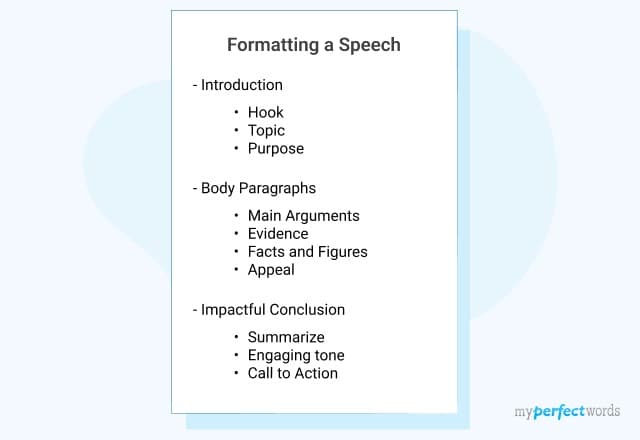
How to Start A Speech - 13 Interesting Ideas & Examples
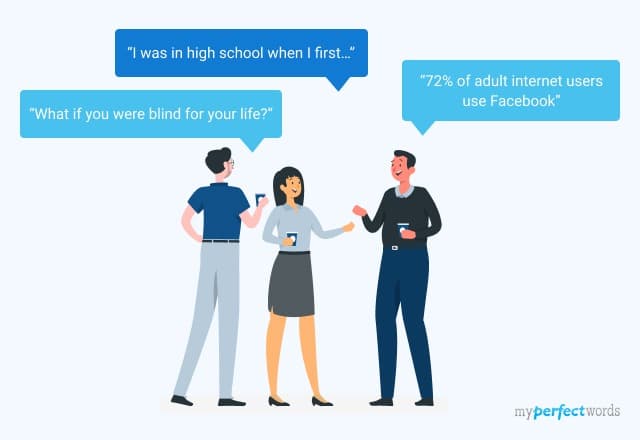
20+ Outstanding Speech Examples for Your Help
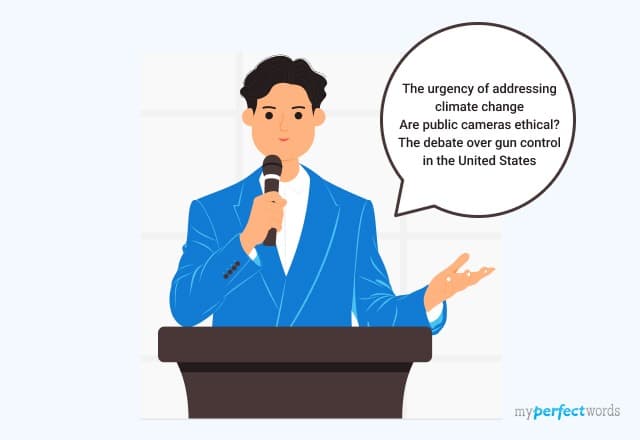
Good Impromptu Speech Topics for Students

Entertaining Speech Topics for Your Next Debate
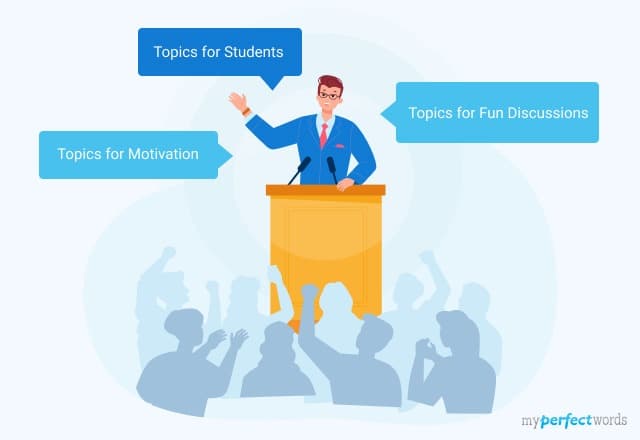
How to Write a Special Occasion Speech: Types, Tips, and Examples
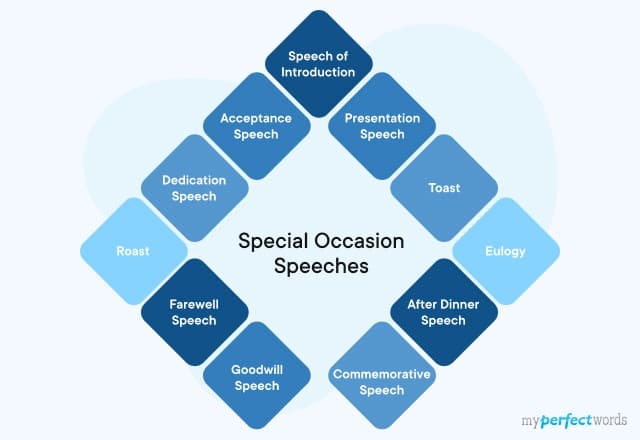
Introduction Speech - A Step-by-Step Guide & Examples
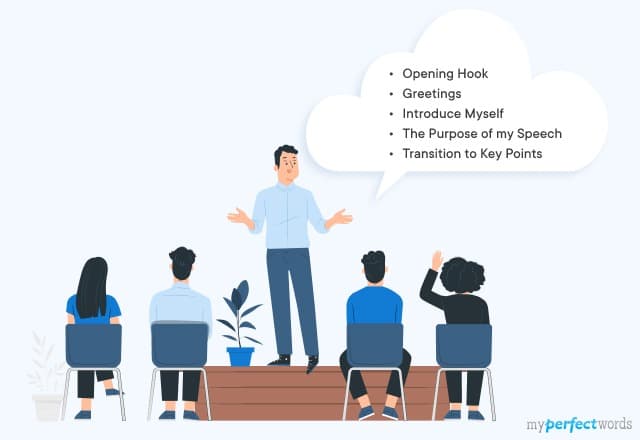
How to Write the Best Acceptance Speech for Your Audience?

Presentation Speech - An Ultimate Writing Guide

Commemorative Speech - Writing Guide, Outline & Examples
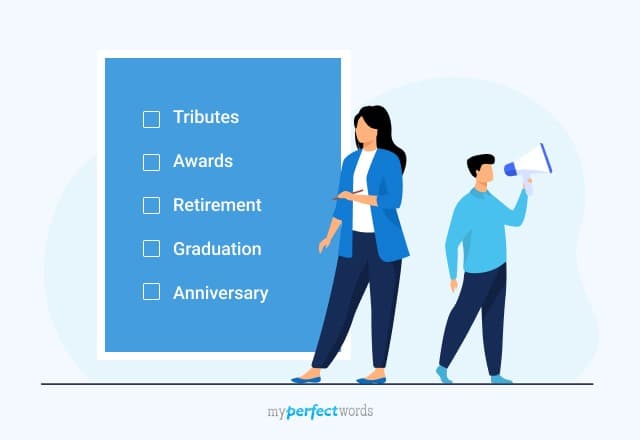
Farewell Speech - Writing Tips & Examples

How to Write an Extemporaneous Speech? A Step-by-Step Guide

Crafting the Perfect Graduation Speech: A Guide with Examples
